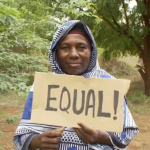A World Bank survey in Kenya that seeks women’s input and data to inform agricultural policy shows that female farmers have limited access to water, energy and finance, and few women own property they can use as collateral for loans. As agriculture becomes ‘feminized’ and men abandon farms to work in cities, policies must change to >> Read more
News: Women compete better when they are in teams, research finds
[Source: Guardian] Nearly two-thirds of the "gender competition gap" – the gap between the likelihood of men or women to enter a competition – disappears when people are offered the chance to compete in two-person teams rather than as individuals. Academics Andrew Healy and Jennifer Pate claim that their findings, published in the Economic Journal, >> Read more
News: Ghana: Group Puts Women’s Inheritance Rights Under Spotlight
Source: AllAfrica 03/08/2011 The right of women to inherit their deceased husbands is one that has faced great resistance from adherents of traditional customs and some religious sects in most African societies, and therefore requiring concerted efforts to bring about the needed change that will recognise women as equal partners in relationships, with inalienable right >> Read more
News: Rape reporting during war
Reports of sexual violence during the ongoing unrest in Libya have captured headlines across the world. Libyan leader Muammar al-Qaddafi's forces, some have alleged, were given Viagra to facilitate their rape of hundreds, if not thousands, of victims. Recently, Luis Moreno-Ocampo, the chief prosecutor at the International Criminal Court, and U.S. Secretary of State Hillary >> Read more
News: One-third of foundations in Europe actively support women and girls
Large gap remains between European foundations’ interest and their investments research report european giving 25 May 2011- An estimated 37 percent of surveyed European foundations made grants or operated programmes intended to benefit women and girls in 2009, according to a report released today by Mama Cash and the Foundation Center, at the European Foundation >> Read more
News: USAID Administrator Rajiv Shah announced the establishment of USAID’s new Office of Gender Equality and Women’s Empowerment.
The Economic Growth, Agriculture, and Trade's (EGAT) Women in Development Office is being transformed into a new Office of Gender Equality and Women's Empowerment, focused on building partnerships that can deliver results. This office will also give greater support to female entrepreneurship, scale up initiatives designed to enhance women's ownership of key assets like land >> Read more
Gates Blog: The Importance of Investing in Women Farmers
Last week was an exciting time to be working for women farmers as they contribute to poverty reduction and agriculture development. Two new reports articulated the business case why we should all be targeting our efforts and resources to getting women farmers the tools and resources they need to manage productive farms and control the >> Read more
News: ALINe working with the World Food Programme’s Purchase for Progress initiative to further women’s economic empowerment
ALINe is supporting the World Food Programme (WFP) in the development of the Purchase for Progress (P4P) global gender strategy. Through the P4P initiative, WFP is using its purchasing power to offer smallholder farmers opportunities to access agricultural markets, become competitive players in those markets and thus improve their livelihoods. P4P provides a particularly appropriate >> Read more
News: UN Agencies to launch new report on gender and work in agricultural and rural areas
Media Advisory no.: MA/01/11 Joint FAO/IFAD/ILO Media Advisory Rome, 19 January – Three United Nations agencies are to launch a ground-breaking study and a set of action-oriented policy briefs on gender and work in agricultural and rural areas here on 21 January. The findings have important implications for how economic and food price crises affect >> Read more
Article: “Parents Give Boys Preferential Treatment When There Is a Chronic Food Shortage”
In situations of chronic food shortage, parents are inclined to give boys a preferential treatment, despite the fact that the health of their daughters suffers more from food insecurity. This is shown by research from the Institute of Tropical Medicine in Ethiopia, appearing in the journal Pediatrics. http://www.sciencedaily.com/releases/2011/01/110111132217.htm
- « Previous Page
- 1
- 2
- 3
- 4
- 5
- 6
- …
- 13
- Next Page »

